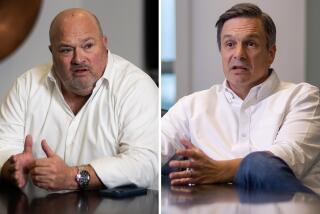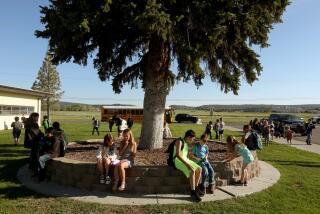Surviving as the School ‘Sinner’
- Share via
In the face of the hubbub at a Catholic school in which two Orange County gay men enrolled their adopted sons, I could not help but recall my experiences at Catholic school in Cleveland in the early 1970 as the child of divorced parents. The question for me is not will the boys’ mere presence harm the school but will the school harm them?
In the ‘70s, divorce was the big no-no. My mother was the first one in her Sicilian (read twice as intense) Roman Catholic family to get one, and the church excommunicated her. Because my father was a gambling addict who missed enough house payments to incur an eviction notice, the divorce didn’t upset my grandparents that much. But knowing their daughter could never again receive Communion nearly killed them.
We moved in with those grandparents. They went to Mass every day, and I went with them in my mother’s place. To further counter any bad spiritual residue that might have rubbed off on me, they insisted on paying my way to Catholic school. My only explanation for why I was accepted is that once my Grandma Rose made up her mind about something, she always got her way. I figure if my Grandpa Joe couldn’t say no to her, no parish priest could either.
Now I see what a miracle this was. Then I only knew what a misery it was.
Divorce was such a sin in the church in those days -- on a par with homosexuality today -- and at school that I was never allowed to forget it. In religion classes, sacraments like marriage were discussed by the parish priest, who always used my family as the example of “the bad way” to handle problems. He would ask me how I felt about my parents’ divorce, and he would be upset when I said I didn’t think it was such a bad thing.
When I messed up on a spelling test, Sister Monica asked the class to pray for me since my “family condition” had so obviously infected my mental capacity. Worse yet, my best friend had a brother who was a priest, so she became Sister Monica’s example of pure piety, me of pure evil. Are the boys in Orange County likely to face this treatment? Not so blatantly today, but it will happen. The question is, how will such treatment affect the boys -- and the church?
I never told my family about Sister Monica or her near daily diatribes against divorce. I knew how much it meant to them that I attend the school. And in the end I knew how much my succeeding there would annoy the folks who lacked an appreciation for my existence.
Critics might say my presence and that of other sinners like me allowed the church to slowly accommodate divorce, to the point where it invited my mother back in -- as long as she never remarried. Some fear this same acceptance will one day come to gay Catholics, to which I say, “About time.”
In the long run, my experiences taught me to question authority. My experiences also made me what we call a “cafeteria Catholic” -- I choose the parts I want; I always assumed Jesus wanted smart followers. Despite Sister Monica’s best efforts to the contrary, at that little church and school, I learned to think for myself.
In the end, I liked my old church so much that I held my wedding there, and now my son attends a local Catholic school. I’ve learned that your family is where you learn what’s right and wrong. The church may teach against homosexuality, but I know my son won’t share those ideas because his own experience with my gay friends and relatives will teach him to judge people as Jesus did -- by whether they treat others as they would like to be treated.
Is it OK for gay families to send their children to Catholic school? I think it’s the smartest move they could make -- for the future of their families and the future of the church.


